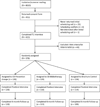Indicated cognitive behavioral group depression prevention compared to bibliotherapy and brochure control: acute effects of an effectiveness trial with adolescents
- PMID: 24099432
- PMCID: PMC3932106
- DOI: 10.1037/a0034640
Indicated cognitive behavioral group depression prevention compared to bibliotherapy and brochure control: acute effects of an effectiveness trial with adolescents
Abstract
Objective: We tested whether a brief cognitive behavioral (CB) group and bibliotherapy prevention reduce major depressive disorder (MDD) onset, depressive symptoms, and secondary outcomes relative to brochure controls in adolescents with self-reported depressive symptoms when school personnel recruit participants and deliver the intervention.
Method: Three hundred seventy-eight adolescents (M age = 15.5 years, SD = 1.2; 68% female, 72% White) with elevated self-assessed depressive symptoms were randomized to a 6-session CB group, minimal contact CB bibliotherapy, or educational brochure control. Participants were assessed at pretest, posttest, and 6-month follow-up.
Results: CB group participants showed a significantly lower risk for major depressive disorder onset (0.8%), compared to both CB bibliotherapy (6.3%) and brochure control (6.5%; hazard ratio = 8.1 and 8.3, respectively). Planned contrasts indicated that CB group resulted in lower depressive symptom severity than brochure control at posttest (p = .03, d = 0.29) but not 6-month follow-up; differences between CB group and bibliotherapy were nonsignificant at posttest and 6-month follow-up. Condition effects were nonsignificant for social adjustment and substance use.
Conclusions: The finding that a brief CB group intervention delivered by real-world providers significantly reduced MDD onset relative to both brochure control and bibliotherapy is very encouraging, although effects on continuous outcome measures were small or nonsignificant and approximately half the magnitude of those found in efficacy research, potentially because the present sample reported lower initial depression.
Figures
References
-
- Ackerson J, Scogin F, McKendree-Smith N, Lyman RD. Cognitive bibliotherapy for mild and moderate adolescent depressive symptomatology. Journal of Counseling and Clinical Psychology. 1998;66:685–690. - PubMed
-
- Arnarson EÖ, Craighead WE. Prevention of depression among Icelandic adolescents. Behaviour Research and Therapy. 2009;47:577–585. - PubMed
-
- Arnarson EO, Craighead WE. Prevention of depression among Icelandic adolescents: A 12-month follow-up. Behaviour Research and Therapy. 2011;49:170–174. - PubMed
-
- Burns DD. Feeling Good: The New Mood Therapy. New York: William Morrow & Company; 1980.
Publication types
MeSH terms
Grants and funding
LinkOut - more resources
Full Text Sources
Other Literature Sources



